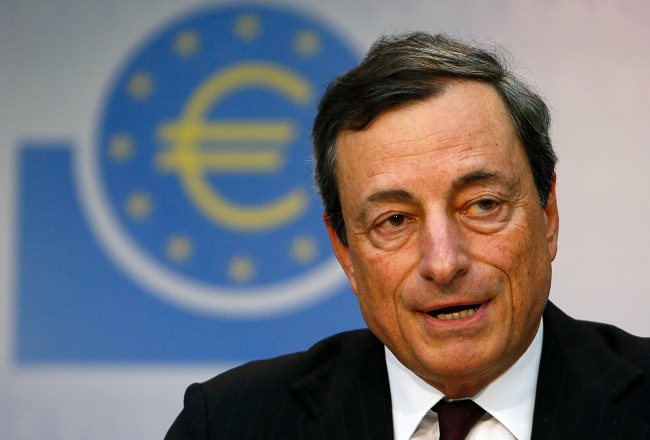FRANKFURT (AFP) ― An apparent improvement in the eurozone economy will allow the European Central Bank to hold its fire on interest rates for the time being at its meeting this week, analysts said.
“The ECB will likely see no pressing need to ease monetary policy still further given the recent improvement in economic data,” Postbank analysts wrote in a note to investors.
In particular, activity in the eurozone private sector has picked up in July, suggesting that the recession in the 17 countries that share the euro could be coming to an end, according to Markit.
Business sentiment is improving in most countries and consumer sentiment in France is also slightly better.
Another positive sign, albeit anecdotal so far, is a drop in unemployment in Spain in the second quarter, the first decline in two years, even if it remains very high at 26.26 percent of the working population.
The ECB pared back its key interest rates to a new all-time low of 0.5 percent in May.
 |
Mario Draghi, president of the European Central Bank. (Bloomberg) |
At the beginning of July, ECB president Mario Draghi pledged to keep them low for as long as necessary or even cut them still further if the need arose.
The comments were seen by some economists as a “mini-revolution” in the ECB’s communication policy since it has never issued such “forward guidance” until now.
Draghi insisted that the policy change was a unanimous decision on the ECB’s governing council, but some dissent has become apparent as to the significance of such a change.
Draghi is therefore likely to be quizzed about this at his regular post-meeting news conference.
ECB executive board member Joerg Asmussen, for example, suggested that the time-frame for the guidance was at least 12 months.
But the ECB quickly back-pedaled, insisting that was not how his comments should be interpreted.
Bundesbank president Jens Weidmann also waded into the fray, insisting Draghi’s comments did not necessarily constitute a decision taken in advance on the direction of interest rates and that the ECB governing council was not tying itself to the mast “like Ulysses.”
“There are clear divisions on the Governing Council over how binding forward guidance should be,” said Capital Economics economist Jennifer McKeown.
“While members were unanimous in their decision to make a vague pledge last month, they may well be unable to agree on a specific time-frame or economic conditions that would need to prevail before higher rates could be considered, not least because conditions vary so much between eurozone countries.
“We therefore expect the same vague guidance to be repeated this month with little clarification of what it means,” McKeown said.
Commerzbank economist Christoph Balz suggested another source of discord that could raise temperatures at the council meeting is the topic of the collateral that the ECB accepts from banks in return for funding.
Eurozone banks appear reluctant to lend to consumers and small- and medium-sized enterprises. And in this context, the ECB announced in mid-July that it intended to ease the collateral rules for so-called asset-backed securities.
Bundesbank president Weidmann and other critics “believe the risks involved with these ABSs are impenetrable to understand,” Balz said.
Thus, as a compromise, the ECB was not buying these instruments from banks “but has softened the criteria under which it accepts them as collateral in order to stimulate bank lending,” Balz said.







![[Weekender] Korea's traditional sauce culture gains global recognition](http://res.heraldm.com/phpwas/restmb_idxmake.php?idx=644&simg=/content/image/2024/11/21/20241121050153_0.jpg)
